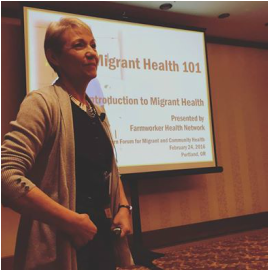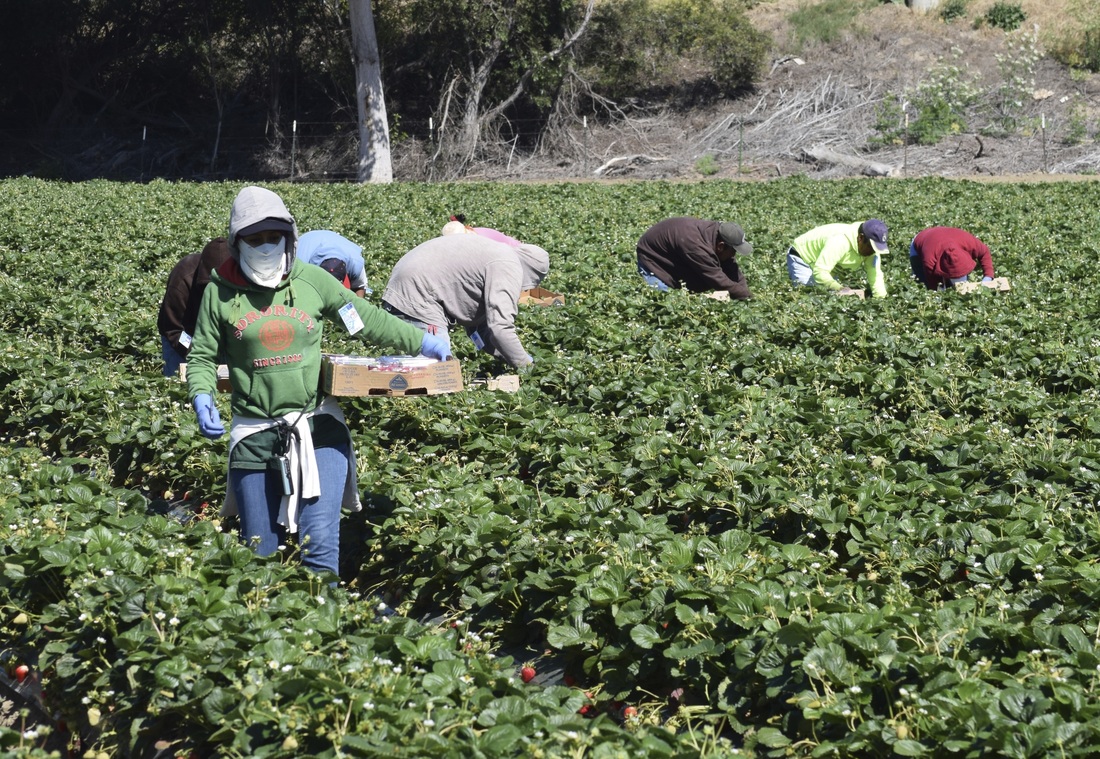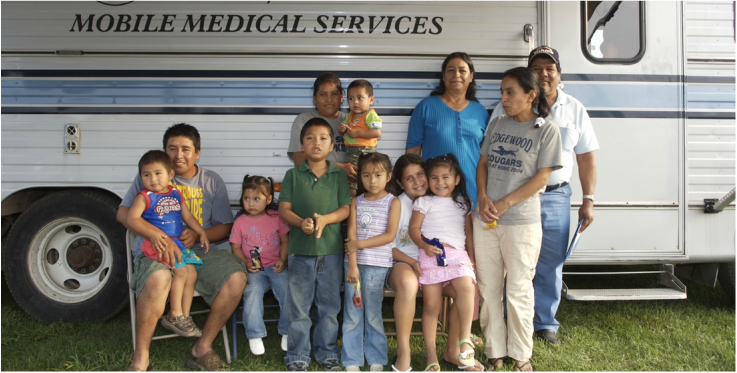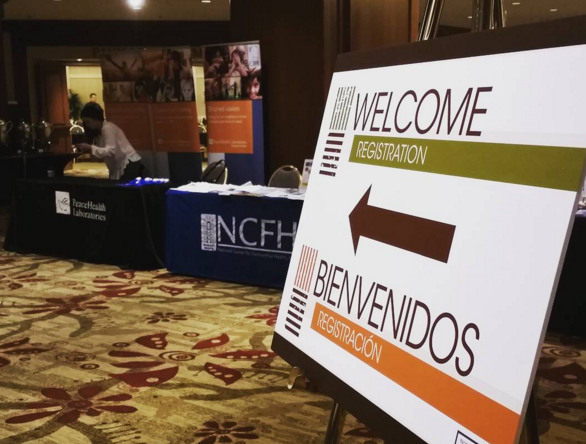|
A woman is a very central, matriarchal, and necessary part of the traditional Hispanic household. Oftentimes one thinks of migrant workers as young men coming to the country to work in the fields. The women who accompany them are too often seen as passive passengers on the dangerous journey many migrant workers face each season.
The month of March honors Women’s History Month. It is important to take time and show recognition for the strong women in the fields who are much more than a passive voice accompanying their male counterparts. “There is no question,” great civil rights and farmworker activist Dolores Huerta says, “that our women are strong. They work right alongside the men in the fields.” And when the day’s labor is done the women go home, cook for their families, help their children with homework or if they’re younger, bathe and feed them. It is very rare that the female farmworker takes time for herself, and she rarely asks for it. There is too much work to be done. Ms. Huerta is right, there is no question whether America’s farmworking women are strong. The question is; how do we give this silent population a voice? According to Cultural Survival there is little known information on the health status of migrating women in the United States. Undocumented female workers face unique barriers, among them, poor occupational health and safety, poor diet, and most are unfamiliar with the affordable health services they are eligible for. The barriers mentioned above do not exclusively affect women. However, one fear that women have reported more frequently than migrant men is the fear of sexual abuse. Many migrant women do not report cases of sexual assault because they fear repercussions. Nearly 50% of the migrant agricultural workforce are undocumented immigrants; too often women remain silent because of their fear of termination or deportation. In the rare occasion that a woman reports abuse, it is usually lengthy process that is not sustainable or affordable for a low-income migrating family. It goes without saying that sexual abuse can cause physical and emotional harm to our women in the fields, especially when abusers are not charged for their crimes. So what can we do to help our mothers, sisters, and daughters in the fields? Community Health Workers and Promotoras de Salud can go out in the fields and educate both men and women on what constitutes as sexual abuse. There are some laws that protect our female farmworkers as well. Abuse in the fields is unacceptable. Abuse in the fields without knowing how to access health services is unacceptable. The National Center for Farmworker Health is calling on Migrant and Community Health Centers to increase their number of farmworkers served to 2 million by the year 2020. No one should fear their mortality or safety because of lack of access to primary and preventative health care services. Find out other ways you can get involved to help women in the fields raise their voices. Photo Credit: iStock Dr. Kelvin Vu was a recipient of the National Health Service Corps scholarship. This scholarship aims to increase the number of primary care physicians and professionals in rural and underserved areas of the United States. Since becoming a doctor, Dr. Vu has worked passionately towards health equity in rural and vulnerable communities. Dr. Vu works with Open Door Community Health Centers, who in 1971, started as just one health center with a fervent mission; to improve access to quality health care to all people of Humboldt County, CA. Now 45 years later, Open Door has 13 health clinics and serves one third of the population in Humboldt County. In an interview with Dr. Kelvin Vu, The National Center for Farmworker Health learned where his passion for providing health care to the underserved originated, how he continues to be a champion for migrant and community health, and how to inspire emerging professionals interested in serving our agricultural workers. How did the NHSC Scholarship help you pave your career path? The NHSC paid my way through medical school. It opened a lot of doors for me. For one I didn’t have to worry about the financial part of it, but it also exposed me to learning a lot about primary care, especially primary care in an underserved area. Because of that, I was exposed to different opportunities, which led me to where I am right now; working in a very remote area and providing primary care services to Humboldt County, in Northern California. What led you to want to champion migrant health in particular? Coming from an immigrant family I’ve always believed that having access to care for all is a very important thing. Getting access to care to people who normally wouldn’t have it, that’s very important. I was raised to believe that people from a certain background, regardless of what they do, what they believe in, and where they came from should have access to care. I currently work in the underserved communities in Humboldt County; our farmworkers are among those communities. Open Door Community Health provides easy access to quality care for everyone. What are some of the challenges you see working closely with underserved and migrant populations? I can list you several. The first thing is lack of transportation, that’s a big challenge. The second is lack of medical insurance, since a lot of farmworkers are undocumented it’s hard for them to get insurance or even qualify for state or federal sponsored services. The third would be the language barrier, some of the patients do speak English, but a majority of them are non-English speaking. Whether it’s Spanish or other native languages. Another thing would be the cultural barrier. All of these barriers lead to a lack of access to care. My clinic is working towards eliminating these barriers. We have a department called Mobile Health Services and so we actually provide care by bringing the care to the people, to where they live. That’s how we’re helping with the lack of transportation barrier. There are two exams rooms in our mobile van. We have a running lab and we do everything we can to provide primary care to all of our patients. To help with the language and cultural barrier we work with promotoras. These are Spanish- speaking health care workers who work closely with me, in not only getting these patients to their appointments, but also help them with follow-up plans. They also help them learn how to manage, for example, diabetes. They are very good at Diabetic education and promoting the importance of diet and exercise. If a patient needs behavioral health, our promotoras are able set up telemedicine for them. We work with a local California university that speaks Spanish, so they don’t have to worry about the language barrier either. With the cost of care and lack of insurance, Open Door has a program called the 340B program, where we work with local pharmacies in providing medications at a cost effective price for our patients. We work hard to eliminate all barriers to accessing quality health. How often do the mobile services run? Everyday. Everyday we are at a different location, but Monday we are always at the same location, Tuesday we’re at the same location and so on. This is basically primary care on wheels, as I like to call it. Patients are able to schedule an appointment and they’re able to walk in. Our patients can see us for acute issues, chronic issues, and also preventive care issues. Patients can get mammograms and pap smears done in the Mobile Health Services van too. What would you say to aspiring professionals within the community and migrant health movement? Figure out what drives you, what are you passionate about? I you are able to find a profession that makes you happy, that will give you financial stability, and that allows you to make a positive impact in your community, that’s what you should aim for. It goes along with my philosophy and everyone’s here at Open Door, we are Americans we live in the land of opportunity, and to have good medical care is a basic right. Great medical care and easy access to care, those two things should always go hand in hand. It’s my goal and it’s my organization’s goal to have no patient left behind. No matter where they come from, no matter what their background is, they will have easy access to quality health care at the end of the day. Those would be the two main pieces of advice I would give to professionals and also NHSC recipients. In 2015, NCFH and the National Association of Community Health Centers launched the Ag Access 2020 campaign, which calls on Migrant and Community Health Centers to increase their number of agricultural workers served from an estimated 800,000 to 2 million by 2020. NCFH is reminded that Dr. Vu and others like him are our champions for access to quality health care for America's Ag worker population.
Mindy Morgan Media & Communications Specialist [email protected] • 512-312-5463  Excitement raced through my body the Monday before I left Austin, TX. I was attending my first Migrant Health conference (Forum) since starting my position at the National Center for Farmworker Health in August 2015. Admittedly, my relationship to the Migrant and Community Health movement was limited to inside our NCFH offices, and I was looking forward to an insightful experience on the importance of, and collaborative participation with, seasoned Migrant Health Champions. I made it to Portland, OR where the Northwest Regional Primary Care Association was holding the annual Western Forum for Migrant and Community Health. I nervously walked into the UPS store and asked if they’d received my shipment of exhibit materials. They had! I waited by my exhibitor table for it to be delivered. I carefully unpacked the materials and introduced myself to other exhibitors and members of the Farmworker Health Network. The following days were filled with inspiring sessions from building and sustaining cultural competency within organizations to discussions on health equity on different governmental levels; each session was as informative and collaborative as the next. Each day I created new connections with my migrant health colleagues. My conversations with community health workers and promotoras de salud inspired me to work smarter towards putting the right tools in the hands that need them. NCFH works hard to create culturally appropriate health education materials for this exceptional population of workers. It was through the CHWs I witnessed the need for better access to quality health care for the population that helps feed America. Nanci Luna Jimenez was this year’s keynote speaker. She moved the room with her vibrancy and enthusiasm for social justice amongst all people. She urged us to recognize that ambiguity exists in our lives and to accept two opposing thoughts to be true. Only with knowing and loving our own culture and ourselves can we truly be champions and allies of another’s. Thank you NWRPCA for hosting a wonderful and inspiring conference this year. Author’s Note: In conjunction with the Western Forum for Migrant and Community Health, NCFH hosts the annual Midwest Forum for Farmworker Health, this year’s conference will be held on October 31st – November 2nd in San Antonio. For more information please contact [email protected]. Written by: Mindy Morgan Media & Communications Specialist [email protected] Photo: NWRPCA & NCFH |
The National Center for Farmworker HealthImproving health care access for one of America's most vulnerable populations Archives
July 2024
Categories
All
|




 RSS Feed
RSS Feed